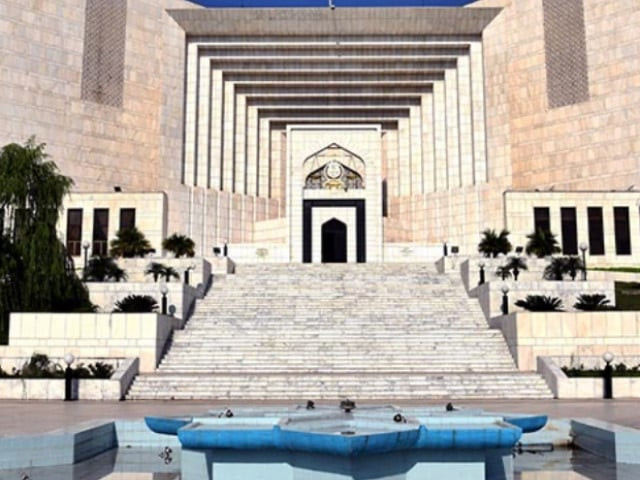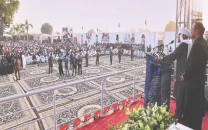Fear of authoritarianism driving SC decisions
Cabinet members fear SC will take up PTI petition for inquiry into alleged rigging in elections after CJP’s retirement

Fear of authoritarianism among institutions and political parties is pivotal in shaping national politics in the country.
Although there is no threat to the existence of the present government following the Supreme Court’s July 12 order, senior cabinet members are expressing apprehensions that after the retirement of Chief Justice of Pakistan (CJP) Qazi Faez Isa, the Supreme Court will take up PTI petition for an inquiry into the alleged rigging of the 2024 elections. Consequently, the present government may be dissolved.
A member of the cabinet confirmed to The Express Tribune that this apprehension is the cause of the strong reaction to the apex court’s majority order.
On July 12, the Supreme Court declared the PTI eligible for a share of reserved seats in national and provincial assemblies. The judgement was announced by a 13-member bench in an 8-5 ruling.
On the other hand, several lawyers believe that the majority of judges, through the July 12 order, halted the government’s plan to provide a judicial package.
There is an apprehension that the proposed judicial package will affect the independence of the judiciary.
If the ruling parties secure 23 seats, the government would be in a position to achieve a two-thirds majority in the parliament.
Even the majority of judges did not agree with Justice Jamal Khan Mandokhail’s note.
Lawyers say that the note does not mention the ‘peculiar circumstances and facts of the general elections,’ which are crucial to deciding this matter.
Secondly, there may be apprehension that if the majority endorses Justice Mandokhail’s note, the government could be in a position to obtain the numbers needed to amend the Constitution for the judicial package.
Lawyers say that the majority of judges are concerned that the proposed judicial package will affect the independence of the judiciary.
It is also being witnessed that there is also mistrust among the apex court judges.
It has been learned that a meeting of the three-judge committee was held on Thursday to discuss the roster for next week.
One of the meeting’s agenda items was the fixation of the PML-N’s review petition against the July 12 order, in which the ECP was directed to allocate reserved seats to PTI.
However, two members of the committee, Justice Syed Mansoor Ali Shah and Justice Munib Akhtar, objected to the early fixation of the review petition.
Firstly, the detailed judgment in the reserved seats case has yet to be issued. Secondly, the judges are sitting in different registries as summer vacations have started.
However, CJP Isa has dissented from the majority members of the committee.
The debate continues on why the government is overreacting to the July 12 order, as it does not affect the government’s position.
Lawyers are wondering what kind of judicial package was being introduced that was rejected by the majority of judges and why the government is so keen to secure a two-thirds majority.
The government’s reaction to the July 12 order reflects that the majority judgment has scrapped a special plan that could have been implemented through a constitutional amendment.
Now all eyes are on CJP Isa to see how he will protect the independence of the judiciary. His policy was not effective regarding the letter from six Islamabad High Court judges about the interference of agencies in judicial functions.
It has been observed that the fear factor has played a key role in shaping national politics over the past three years.
PDM parties were expressing apprehension that if former prime minister Imran Khan were allowed to continue, he would appoint ex-Lt Gen Faiz Hameed as the next army chief, and PTI would remain in power for the next five to 10 years.
Later, Imran Khan made a concerted effort to push for early general elections so that the PDM government could not appoint the next army chief. Despite his efforts, he was unsuccessful.
In the meantime, PTI dissolved the Punjab and Khyber-Pakhtunkhwa assemblies to push for general elections during the tenure of former CJP Umar Ata Bandial.
One section of judges was also interested in holding general elections during the tenure of Bandial.
On the other hand, the PDM government and a section of judges wanted the general elections to be held during CJP Isa’s tenure. Ultimately, the PDM government succeeded, and the elections were held during CJP Isa’s tenure.
There are reports that the ECP may show reluctance in implementing the July 12 order. However, PTI is satisfied that the judicial package cannot be introduced at present. The detailed judgment will be crucial in determining the future of the ECP.
There are serious concerns about why there is such urgency in the early fixation of the review petition against the July 12 order.



















COMMENTS
Comments are moderated and generally will be posted if they are on-topic and not abusive.
For more information, please see our Comments FAQ